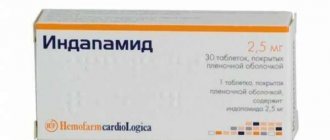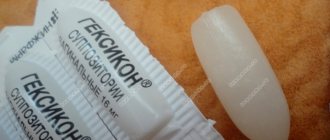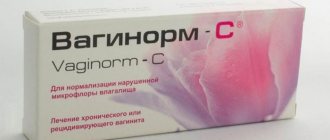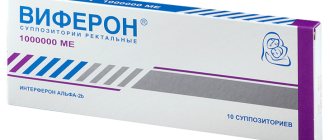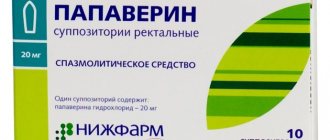Today, the most effective suppositories for thrush are the most acceptable option for local therapy for such an uncomfortable female ailment. The effective operation of suppositories for the reproductive organ is explained by the significant penetration of the active component into the mucous membrane. This contributes to the “death” of the causative agent of the fungus Candida and the elimination of inflammatory processes, reducing the signs of candidiasis.
Today on the pharmaceutical market you can find inexpensive but effective suppositories for thrush for absolutely any age category of women. But a girl who is faced with such a problem for the first time may experience certain difficulties when choosing drugs from a significant range.
How to choose an effective drug for candidiasis? What kind of suppositories are there for thrush, and how are they different? These and some other questions can be answered below.
Rules for using suppositories against thrush
It is recommended that both partners treat candidiasis, since thrush in men is often asymptomatic and the man is simply a carrier of candidiasis.
In the absence of therapy with a regular partner, a ping-pong effect occurs when a woman, after treatment, is again subjected to a fungal attack during unprotected sexual intercourse.
During therapy, you should either abstain from sexual intercourse or use condoms. Suppositories are inserted deep into the vagina at night to improve absorption of the drug.
When a woman is diagnosed with vaginal candidiasis, she and her doctor should analyze the causes of thrush, since without eliminating or minimizing the provoking factors, thrush can occur again and again.
Very often, candidiasis indicates the presence of other sexually transmitted infections (chlamydia, mycoplasmosis, gonorrhea, trichomoniasis, etc.) as well as the development of bacterial vaginosis, gardnerellosis (discharge with the smell of fish).
Depending on the intensity of the symptoms, acute or chronic process, treatment may differ in the course of therapy, in some cases it is enough to use 1 suppository, but in case of a chronic process this is not enough and longer treatment is required.
- Vaginal suppositories should not be used during menstruation, with the exception of Povidone-Iodine (Iodoxide, Betadine) and Sertaconazole (Zalain).
- The following suppositories can be used for 1 suppository: Zalain, Lomexin
- 3 suppositories each - Livarol, Gino-pevaril, Pimafucin.
- 5-14 suppositories each - Macmiror, Clotrimazole, Ginesol, Iodoxide, Nystatin, Polygynax, Terzhinan, Irunin.
During treatment, you should not wear synthetic, tight-fitting underwear, you must follow all the rules of intimate hygiene, change towels and linen daily, do not use chemicalized, scented pads, toilet paper, or intimate hygiene fluids, which only worsen the condition.
Since suppositories for candidiasis contain various active ingredients, they differ in terms of treatment, effectiveness, as well as contraindications and side effects. The table provides a list of which suppositories can treat thrush, their active ingredient, analogues, brief instructions for use, advantages, disadvantages of use, price comparison. The use of any medications is possible only as prescribed by a doctor (see also anti-inflammatory suppositories in gynecology).
What's included
Vaginal suppositories contain antibacterial components. These are substances that completely destroy bacteria and help stop their further reproduction. Suppositories containing antibiotics relieve all symptoms and clinical manifestations.
The most common and effective drugs are Penicillin, Trixomazole, and Chlorhexidine. These are odor and discharge suppositories that begin to act within 15 minutes after administration. Preparations that contain iodine and macrolides have proven themselves well. Antibiotics have contraindications for use, so you should not self-medicate. Patients may experience an allergic reaction, suppression of the natural microflora in the vagina.
Often, to treat diseases associated with the vagina, women's suppositories are used for secretions with an anti-inflammatory mechanism of action. They contain non-steroidal components that eliminate the signs and clinical manifestations of the inflammatory process. This may be painful sensations, swelling.
Components such as diclofenac, ichthyol, and indomethacin are added to such suppositories. In some cases, strictly according to the doctor’s indications, medications with prednisolone may be prescribed. Pharmaceutical companies produce rectal and vaginal suppositories that have an anti-inflammatory effect and contain herbal ingredients.
Advantages and disadvantages of using suppositories for thrush
Advantages of using topical medications for candidiasis in women:
- When the drug is administered to a place where fungi actively multiply, the effect of local treatment appears much faster, especially when using modern effective drugs such as Livarol or Zalain.
- Modern antifungal agents can be used once.
- Because systemic absorption of topical medications is low, the incidence of side effects is reduced, unlike oral therapy.
Disadvantages of local treatment:
- Local treatment causes some inconvenience to a woman - it stains her underwear and limits her sex life.
- A positive effect from such therapy is possible only in mild forms of thrush, but when the course of the disease is more severe and prolonged, local therapy should be supplemented with the use of antifungal drugs in tablets. Therefore, it is often necessary to repeat the course of treatment after a certain time.
- When using combined antimicrobial drugs, such as Terzhinan, Polygynax, a common side effect is vaginal dysbiosis, which then requires additional treatment, for example, the use of suppositories with lactobacilli - Lactonorma, Acylact, Lactobacterin, Ecofemin or Vagiflora.
"Livarol"
Vaginal antifungal suppositories contain the active ingredient ketoconazole. The medicine "Livarol" acts against yeast-like fungi Candida and dermatophytes. When treating, doctors take into account the following features of the drug:
- used to combat candidiasis, as a prophylactic against mycosis of the female genital organs during the use of antibiotics;
- suppositories are administered at night, once a day, the course lasts up to ten days, agreed with the gynecologist;
- disadvantage - the pathogenic microorganism becomes resistant to the drug with long-term use.
In gynecology, antifungal drugs in suppositories are widely used. "Livarol" is highly effective and does not cause allergic reactions. The drug also has the following features:
- contraindications: intolerance to the composition, first trimester of pregnancy;
- side effects - there may be nausea, dizziness, coordination problems, itching and burning in the injection area;
- under medical supervision, use is allowed in the second and third trimesters of pregnancy, as well as by patients under twelve years of age;
- cost - five suppositories for 430 rubles.
What other effective antifungal suppositories are known?
Suppositories for thrush during pregnancy
Very often, thrush occurs in women during pregnancy due to a physiological decrease in immunity, and many drugs either categorically cannot be used, or reliable studies of safety for the fetus have not been carried out. Among the entire selection of local drugs, the following suppositories for thrush during pregnancy are approved for use:
- Suppositories - Pimafucin, Primafungin (active ingredient Natamycin).
- Combined drug - Macmiror complex (active ingredients Nystatin and Nifuratel).
- In the 2-3 trimesters Clotrimazole, Nystatin (low effectiveness) or the ancient remedy Borax in glycerin (Sodium tetraborate in glycerin), Pimafucin, Gino-Pevaril, Ginofort (vaginal cream), all these drugs are used during pregnancy with caution if there is a potential risk for the health of the mother exceeds the risk for the child.
- Some doctors prescribe a combination drug - Terzhinan (prednisolone, neomycin, ternidazole, nystatin), but the instructions for it indicate that from the 2nd trimester it can only be used when assessing the potential benefit to the mother and harm to the fetus, since it has undesirable side effects and contains a hormonal drug - prednisolone.
Author:
Selezneva Valentina Anatolyevna physician-therapist
"Terzhinan"
These vaginal tablets have a combined effect on the female reproductive system. The drug has anti-inflammatory, antiseptic, antifungal and antibacterial effects.
The therapeutic effect is ensured by the components included in its composition:
- prednisolone – inhibits the inflammatory process, prevents allergies;
- ternidazole – acts against fungi and trichomonas;
- nystatin – kills Candida yeast microorganisms;
- neomycin is an antibiotic against fungus with a wide spectrum of effects.
Vaginal tablets are characterized by the following properties:
- used once a day, the therapeutic course lasts as long as the gynecologist prescribes;
- used in the treatment of vaginitis (the process of inflammation of the vaginal mucosa), candidiasis, prevention before operations of the reproductive system;
- contraindications – children’s age and sensitivity to the composition;
- side effects - itching and burning; in case of overdose - skin rashes, urticaria;
- price - six pieces for 410 rubles.
What else is on the list of antifungal suppositories for women?
Phytosuppositories with propolis: composition, what they help and how to use them
Propolis is a sticky substance collected by bees in the spring from tree buds (especially poplars and conifers) and modified with enzymes.
Used as a natural antibiotic, anti-inflammatory or analgesic. Propolis is also widely used in folk medicine.
The main effective component of propolis are flavonoids, which have the following effects:
- anti-inflammatory and analgesic;
- regenerative;
- reparative (improving blood flow);
- antiexudative (reduces vascular permeability and the release of fluid into the body);
- antifungal;
- antitumor;
- antiviral;
- anti-diabetic;
- anti-radiation;
- anti-asthmatic.
Phytosuppositories with propolis are available in the form of suppositories (ear, vaginal and rectal).
Compound:
The composition of candles for the treatment of ears, nose and throat includes propolis extract as the main component, as well as beeswax, herbs with a healing effect, mint, eucalyptus, lavender and other essential oils.
Vaginal and rectal suppositories Fitor contain propolis, a fat base and excipients (emulsifier, polyethylene oxide 1500 and polyethylene oxide 6000).
What is the effect of phytosuppositories with propolis based on:
Propolis has antibiotic activity against viruses, bacteria and other organisms. Commercial propolis preparations retain these properties, according to test tube studies. Test tube and animal studies have also shown that propolis also has antioxidant properties that protect the liver.
Propolis contains proteins, amino acids, vitamins, minerals and flavonoids. For this reason, some people use propolis as a dietary supplement, although it would take a very large amount of propolis to provide the body with meaningful amounts of these nutrients.
Propolis can stimulate the body's immune system. Test tube studies have shown significant activity of propolis against bacteria and yeasts associated with caries, gingivitis and periodontal disease.
Propolis extract may be useful in protecting and shortening the duration of colds. A preliminary study in humans found that propolis extract (unspecified amount) reduced the duration of upper respiratory tract infections in children. One small, double-blind study of 50 people with colds found that the group taking propolis extract (amount unspecified) recovered faster compared to the group taking a placebo.
Local application of creams, ointments and phytosuppositories with propolis helps speed up the treatment of certain diseases. A controlled study found that men and women with recurrent genital herpes simplex virus who used propolis ointment recovered significantly faster compared to those who used a placebo or topical antiviral drug. In a small, double-blind study, women with cervical inflammation (cervicitis) recovered soon after 10 days of using vaginal dressings containing 5% propolis.
What are phytosuppositories with propolis used for:
- for the treatment of gynecological and urological problems such as cervical erosion, cystitis and prostatitis;
- for sinusitis, rhinitis, tonsillitis and other diseases treated by ENT specialists;
- rectally, for the treatment of hemorrhoids and fissures in the anus;
- for the treatment of problems associated with hearing loss, ear plugs, acoustic neuritis, tinnitus;
- for prevention purposes.
Who should not use phytosuppositories with propolis:
If there is perforation or other damage to the eardrum, ear pus, tumor processes in the head, inflammation or injury to the external auditory canal, suppositories with propolis should not be inserted into the ears. These suppositories should not be used by pregnant women or persons with hypersensitivity to bee products, however, there are very few reviews of allergies to propolis.
If you have kidney failure, blood diseases, tuberculosis or the presence of a malignant tumor, you should definitely consult with your doctor before using suppositories.
Itchy skin rashes
The rash appears as a result of exposure to many pathological factors. If itching occurs, the range of causes narrows significantly. Based on the location and appearance of the rash, an approximate diagnosis can be made.
Fungal skin rash
The most common situations:
- If the rash is localized in intimate places and on the skin of the foot, then the cause is fungi. Most often these are fungi of the genus Candida and Microsporum. The rash caused by a fungal infection has a specific appearance: the affected skin becomes covered with a dry and peeling crust. The areas merge with each other, forming small clusters. The color of the skin over the fungal rash differs sharply from healthy skin, and the affected area is raised. The fungus causes burning and severe itching.
- The appearance of a rash is provoked by viral infections such as measles, rubella, and chickenpox. These diseases should be clearly differentiated. With chickenpox, skin manifestations appear in the form of small papules, which then turn into vesicles. They burst after 1-2 days and become crusty. A peculiarity of chickenpox is that at the same time new “young” spots, vesicles and crusty hemorrhages are found on the body. Chickenpox rashes are also very itchy and cause discomfort.
Chickenpox rash polymorphism
An itchy rash can be caused by mosquito bites and taking medications that cause an allergic reaction. They are characterized by single rashes, in the center of which the remains of an insect sting should be found. In the first 2-3 hours, an area of hyperemia forms around it, swelling forms, and this place begins to itch.
Diaper rash
Very often, infants show signs of irritation that are associated with prolonged wearing of diapers - itching and peeling occur in the perineal area. In adults, they can also form in natural folds. The reason for its appearance is the action of chemicals (powders, solutions, detergents), poor diet (sugar and fatty foods).
Allergic rashes are characterized by severe itching and flaking and can be localized throughout the body. Most often they are found on the face (with food allergies).
Review of effective drugs
The pharmaceutical market presents a large selection of suppositories, the selection of which is a medical prerogative. The types of suppositories most often used in clinical practice are Metronidazole, Chlorhexidine, Hexicon, Syntomycin and Pimafucin.
Suppositories called Metronidazole help fight nonspecific types of vaginitis. The duration of their treatment is about 10 days, but this depends on how advanced the pathology has become. Therapy can be repeated after 4-6 weeks. Treatment with the drug should be carried out only against microorganisms that are sensitive to it. In this case, the doctor will help the woman cope with the discomfort.
Suppositories with the name Chlorhexidine are indicated for the treatment of bacterial vaginosis. It is also prescribed by specialists during the period of preparation for surgical intervention in the field of gynecology. It can be used as protection against sexually transmitted infections. If a woman has the corresponding symptoms of vaginosis, this medicine will be effective. For example, the vagina itches, itches, or there is irritation on it. All these undesirable phenomena can be eliminated with a dosage regimen that is correctly planned by a specialist.
Hexicon suppositories are a drug that allows you to get rid of vaginosis of bacterial etiology and colpitis. Suppositories help prevent the occurrence of sexually transmitted infections, like other drugs intended for intravaginal treatment.
Synthomycin is indicated for use from 7 to 10 days, but the number of days for use should be checked with the doctor who prescribes this drug. Teenage girls can use no more than 2 suppositories per day. The effectiveness of the drug must be assessed 5 days after treatment was started.
Pimafucin is one of the most commonly prescribed types of vaginal suppositories. It has gained its popularity among patients, among other things, due to the fact that it is able to quickly influence the source of inflammation. The main reason for prescribing the drug is vulvovaginal candidiasis. When used intravaginally, effectiveness is visible after 3-6 days.
3 Intravaginal suppositories with fluconazole
Diflucan, fluconazole, flucostat, mycosist, fucis, tsiskan, fluzak, fungolon, flunocorum funzol, nofung, medaflucon
These are effective vaginal suppositories for the treatment of thrush caused by other…
Diflucan, fluconazole, flucostat, mycosist, fucis, tsiskan, fluzak, fungolon, flunocorum funzol, nofung, medaflucon
These are effective vaginal suppositories for the treatment of thrush caused by yeast-like fungi (Microsporum, Candida and Trichophyton).
Fluconazole is a triazole antifungal drug. Its mechanism of action is based on disruption of styrene synthesis in cells, their destruction and destruction.
Side effects when using vaginal suppositories with fluconazole can manifest themselves as follows: cramping abdominal pain, flatulence, headaches, migraines, lethargy, loss of coordination, changes in peripheral blood (thrombocytopenia, leukopenia, agranulocytosis). All these manifestations occur when the daily dose is exceeded, with prolonged and uncontrolled use of suppositories or in patients with concomitant somatic pathologies, in elderly patients and in children.
The use of drugs with fluconazole is contraindicated in the following cases:
— People with individual intolerance to candle components; - During pregnancy at any stage; - During lactation (due to the possible manifestation of side effects in the child in the form of severe flatulence, anxiety, lethargy and changes in peripheral blood); — Children under three years old; - When used simultaneously with astemizole, cisapride and terfenadine; — For diseases of the heart and blood vessels with atrial fibrillation and ventricular flutter; — These intravaginal drugs are prescribed with caution for functional and organic diseases of the liver and gallbladder (they can cause hyperbilirubinemia, progression of hepatitis and the development of jaundice), with autoimmune diseases, and in the elderly.
Read more
0
A little about vaginal candidiasis
A fungal infection that affects the vaginal mucosa causes a lot of trouble in a woman’s daily life.
Candida (a parasitic fungus), in conditions of reduced immunity or long-term use of hormonal pills, becomes aggressive and actively multiplies (causing vaginal candidiasis).
Candidiasis is a contagious disease transmitted through close contact with a carrier or a sick person. It refers to infections that are easily transmitted sexually. Often the pathogen lives in a man’s body and does not manifest itself in any way.
Vaginal candidiasis manifests itself immediately - severe itching, swelling, curd-like discharge with a sour smell, sometimes pain along the urethra, pain in the lower abdomen. These symptoms are accompanied by discomfort and nervousness, which interfere with work, study, sleep, and doing usual things at home, and also completely exclude the sexual life of both partners.
In this situation, suppositories are the most correct method of destroying the main cause of the disease, since it is the female half who feels the first signs of candidiasis especially acutely. In order to prevent transition to the chronic stage, doctors usually consider the combination of suppositories for local treatment of thrush with capsules and tablets for internal use to be effective.
Important! Only a gynecologist can prescribe the correct treatment for thrush, based on the results of laboratory tests and visual examination. Uncontrolled use of vaginal suppositories for the outbreak of thrush or unsuitable douching will only aggravate the situation and delay the recovery process.
